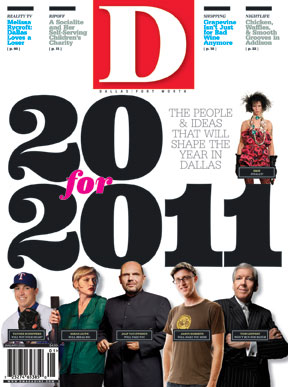
#4
This man’s name is pronounced SA-lah BOOK-uh-doom.
Really, Herb Kelleher got the whole thing started. When Salah Boukadoum was 15, he showed enough talent that the head of the piano department at UT Austin accepted him as a student. Not only couldn’t Boukadoum’s parents afford lessons, but they couldn’t afford to send him from Dallas to Austin twice a month to take them. His teacher offered the lessons for free and, unbeknown to Boukadoum, wrote a letter to Kelleher explaining his pupil’s situation. The legendary CEO of Southwest Airlines sent Boukadoum 12 round-trip flight vouchers and a note wishing him good luck with his career.
Boukadoum took advantage of that generosity. He studied hard, won a few piano competitions, and went on to travel the world, playing concerts. But by the time he was 27, he’d had enough. “It’s a very lonely life,” he says. “You’re always on the road. You’re performing, doing something very private and intimate, in front of strangers. And then you’re gone two days later.”
He walked away from his playing career in 1994 and went into business with his brother, writing software for ATMs and then for those point-of-sale boxes you swipe your credit card through. The Boukadoum brothers did well for themselves and sold the business in 2005. Boukadoum says they cashed in for eight figures, and he got seven of them. It wasn’t enough to retire on, but he took three years off to figure out what he wanted to do next.
He remembered a dinner he’d had years ago in Kenya, during his touring days, when he was seated next to that country’s director of the World Bank. The conversation that night sparked a lifelong interest in fighting poverty. Now Boukadoum, the successful entrepreneur, came to two conclusions: 1) business can end poverty, but 2) the kinds of businesses that can do that will never generate high enough returns to attract capital investment. He decided to do something about that.
In 2009, he started selling top brands of all-natural body-care products called Soap Hope. At the end of every year, Soap Hope gives all of its profits to organizations that make micro-loans, such as Chiapas International, founded by Lucy Billingsley. But the money from Soap Hope is not a donation; it’s a loan. The recipient must pay back the funds in a year. All Soap Hope does is delay its profits. In so doing, it gains a marketing edge over its competitors, appealing to socially conscious consumers.
Soap Hope isn’t Boukadoum’s answer to poverty, though. It’s just a proof of concept. He calls his larger idea Good Returns. It’s a way for any business to loan money to a nonprofit organization with a sustainable business model. It could be a soap company making micro-loans in Latin America, or it could be, say, a law firm making low-cost student loans to Afghans who want to become judges. Good Returns would become its own nonprofit, providing a Good Housekeeping-type seal of approval for participating companies and offering insurance to guarantee the loans.
That was the initial idea. Boukadoum had in mind signing up 1,000 small companies with the Good Returns model and pushing something like $1 billion of capital toward anti-poverty efforts. But in the last few months, he has begun to head in another direction. One night a couple of months ago, a professor from UT Arlington named Michael Buckley heard Boukadoum give his standard speech. Buckley’s take: this Boukadoum fellow had a bigger idea than he realized. Instead of going to small companies and asking them to delay their profits for a year, why not ask the shareholders of a large public company to check a box on their proxy forms and do the same thing?
In business parlance, this is called scaling up—big time. Boukadoum has already targeted a couple of local corporations. He is assembling a team of Dallas business leaders to help him make his pitch, to show—oh, just pick one at random—PepsiCo how it can make an enormous impact on poverty while still serving its own selfish business interests. He has given himself until the middle of 2011 to make it happen.
“I go around trying to light sparks everywhere I can,” he says, “just in case it happens to be the one spark in the right place at the right time.”
Just like that airline executive and the promising piano student all those years ago. —T.R.





